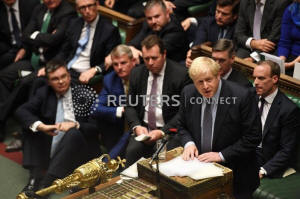Brexit in the balance as Johnson faces crunch votes
 Send a link to a friend
Send a link to a friend
 [October 22, 2019]
By Andrew MacAskill and Kylie MacLellan [October 22, 2019]
By Andrew MacAskill and Kylie MacLellan
LONDON (Reuters) - Prime Minister Boris
Johnson faces two pivotal votes in parliament on Tuesday that will
decide if he can deliver on his promise to lead the United Kingdom out
of the European Union in nine days' time.
As the clock ticks down to the latest Oct. 31 deadline for Britain's
departure, Brexit is hanging in the balance as a divided parliament
debates when, how and even whether it should happen.
After he was forced by opponents into the humiliation of asking the EU
for a delay that he had vowed he would never seek, Johnson is battling
to ram legislation through the House of Commons that will enact his
last-minute Brexit deal.
In yet another day of high drama, lawmakers vote at around 1800 GMT on
the 115-page Withdrawal Agreement Bill and then vote on the government's
extremely tight timetable for approving the legislation.
"I hope parliament today votes to take back control for itself," said
Johnson, the face of the successful 2016 referendum campaign to leave
the EU.
"The public doesn't want any more delays, neither do other European
leaders and neither do I. Let's get Brexit done on 31 October and move
on."

Defeat in either vote would scupper Johnson's plans to leave the EU with
or without a divorce deal on Oct. 31. He would have to decide whether to
abide by a law that demands he accept any Brexit delay offered by the EU
or somehow leave without a deal.
Victory, an imperfect indicator of support for Johnson's deal, would
give opponents in parliament another chance to ambush the government
with amendments that could wreck Johnson's plans by demanding a much
closer post-Brexit relationship with the EU.
The pound was flat at $1.2946 in London trading. Foreign exchange
markets now price in Britain either leaving with a deal or delaying
Brexit, or possibly both.
Johnson's spokesman said that if parliament voted down the legislative
timetable, that would make a no-deal Brexit more likely.
BREXIT IN PLAY
More than three years since the United Kingdom voted 52%-48% to leave
the European Union, the Brexit crisis is straining the British political
and constitution system to breaking point.
Johnson confounded his opponents by winning a Brexit deal from the EU on
Thursday, though he was forced by his opponents - reluctantly and with a
mere unsigned photocopy - to ask for a Brexit delay on Saturday. House
of Commons speaker John Bercow refused a vote on his deal on Monday.
If Johnson is defeated on Tuesday, much will depend on how the EU plays
yet another Brexit quandary.
[to top of second column]
|

Britain's Prime Minister Boris Johnson speaks ahead of a vote on his
renegotiated Brexit deal, on what has been dubbed "Super Saturday",
in the House of Commons in London, Britain October 19, 2019. ©UK
Parliament/Jessica Taylor/Handout via REUTERS

European Council President Donald Tusk said he was discussing the
request for a Brexit delay with the leaders of the other 27 member
states and would make a decision "in the coming days".
"I have no doubt that we should treat the British request for an
extension in all seriousness," Tusk told lawmakers in the Strasbourg
assembly of the European Union parliament. "A no-deal Brexit will
never be our decision", he said to applause from lawmakers.
In a sign of the frustration in Brussels, European Commission
President Jean-Claude Juncker said Brexit was a waste of time and
energy and that the European Parliament could only approve Johnson's
deal after the British parliament.
Brexit Party leader Nigel Farage told the EU parliament that another
delay was on the cards.
Behind the daily Brexit combat in parliament, the courts and at
late-night EU summits, a much bigger game is being played over
whether Brexit will happen at all.
But while Johnson faces legislative booby traps at every juncture,
the opponents of Brexit are also deeply divided - one of the main
reasons their campaign to "Remain" failed in the 2016 referendum.
Still, Johnson is asking a divided parliament where he has no
majority to approve in just three days one of the most important
pieces of legislation in recent British history.
The so called WAB (Withdrawal Agreement Bill) will have less time
for debate in the House of Commons than a law to ban the use of wild
animals in circuses, according to the Institute for Government.
Previous bills to implement major European treaties have taken
between 10 and 40 days to get through parliament. Government
ministers said parliament has enough time already to discuss every
intricacy of Brexit.
The opposition Labour Party will vote against both WAB and the
timetable, The Times's political editor said. The Northern Irish
Democratic Unionist Party are also likely oppose both, a UTV
reporter said.
(Additional reporting by Elizabeth Piper and William James in
London; and John Chalmers in Brussels Writing by Guy Faulconbridge;
Editing by Giles Elgood)
[© 2019 Thomson Reuters. All rights
reserved.]
Copyright 2019 Reuters. All rights reserved. This material may not be published,
broadcast, rewritten or redistributed.
Thompson Reuters is solely responsible for this content.
 |